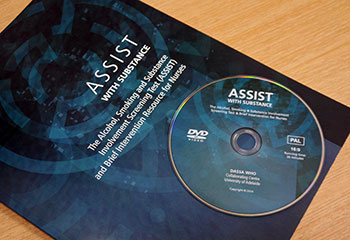DASSA WHO Collaborating Centre
Since 2003, the Clinical Policy and Research Division of the Drug and Alcohol Services South Australia (DASSA) has been designated as a WHO Collaborating Centre for Research in the Treatment of Drug and Alcohol Problems.
In this capacity, we assist WHO in undertaking and coordinating major research activities in the area of prevention and treatment interventions for alcohol and drug use disorders throughout the world, particularly in the Asia-Pacific region. Our work with WHO also focuses on work force development opportunities for international, national and local drug and alcohol workers along with opportunities for placements for higher degree students.
Please visit The WHO website on management of substance abuse.
You can contact the WHO Collaborating Centre via email or phone (+61 8 7425 5122) or by using the details below
| Associate Professor Robert Ali | MBBS FAFPHM, FAChAM |
| Associate Professor Linda Gowing | PhD |
| Jen Harland | Masters in Science (Addiction Studies) |
Promoting Evidence-Based Practice
The DASSA WHO Collaborating Centre has a program of work to promote evidence-based practice in the treatment of drug and alcohol problems. This includes the preparation of systematic reviews and the development of approaches to disseminate the findings of systematic reviews in a form that promotes evidence-based decisions. The DASSA WHO Collaborating Centre is affiliated with the Cochrane Drugs and Alcohol Group (http://cda.cochrane.org/) and is responsible for a number of Cochrane reviews on the management of opioid withdrawal, opioid substitution treatment for the prevention of HIV, and pharmacological treatments for cannabis dependence as well as contributing as co-authors and mentors on other Cochrane reviews.
The work to promote evidence-based practice also includes the preparation of guidelines, such as the current Australian National Guidelines for Medication-Assisted Treatment of Opioid Dependence (available from http://www.nationaldrugstrategy.gov.au/). To be effective in promoting evidence-based practice in the treatment of drug and alcohol problems we also maintain a broad perspective on different treatment options, the status of evidence about their effectiveness and factors influencing how different people might respond to the different options.
We have recently developed a “Recovery Pathway” that is a concise presentation of this broad perspective on treatment approaches.
ASSIST with Substance Training Resource

The ASSIST with Substance training resource highlights the benefits of screening for substance use and how to provide a targeted brief intervention.
Targeted at nurses, the DVD has relevance to health professionals working in a variety of settings.
Via a narrative provided by John Marsden (Kings College London and BBC productions) viewers are invited to explore their own practice and look for opportunistic moments (10–15 minutes) to conduct the Alcohol, Smoking and Substance Involvement Screening Test (ASSIST).
What does the ASSIST Training Resource contain?

The DVD focuses on two scenarios in primary health care settings and one in an emergency department. It provides a breakdown of the screening and brief intervention process and demonstrates the basic principles of Motivational Interviewing using the FRAMES model.
Using the Stages of Change model, the behaviors of the three lead characters are explored and show the changes that can be made following opportunistic screening and brief intervention.
The accompanying manual provides supporting material and further background information.
How to Order this Resource
To order a copy of this resource please contact Greg Macpherson at greg.macpherson@adelaide.edu.au
ASSIST Free Training Available
Are you interested in learning more about the Alcohol, Smoking and Substance Involvement Screening Test and Brief Intervention? Free on-line training is available. Please follow the link for more information and to register:
